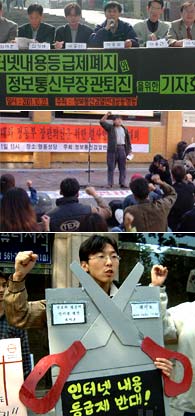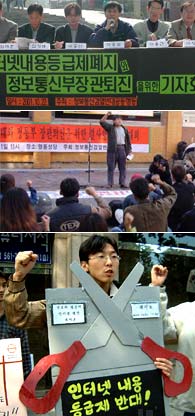Fifteen South Korean gay and lesbian groups have come together to ask a court in Seoul to repeal the government's ban on the country?s first and largest gay website exzone.com, which is run by the Lesbian and Gay Alliance Against Discrimination in Korea.

In November, the owner of the site received a notice stating that if it does not immediately mark itself as a 'harmful site' and install filtering software to prevent youth access, he would be penalised with a fine of approximately US$10,000 or two years' imprisonment.
Activists have called the ban unconstitutional. Protest leader Im Tae-Hun said at a press conference, "The government has no right to determine people's sexual orientation."
Although home users can still access the site, the government has blocked access from state and public premises including state offices, cybercafes, schools and libraries. A government committee for youth protection has designated the site as "detrimental to the morals of young people."
"Even if we don't stand a chance of winning the case," Im continued, "we will take the case to international human rights organisations to call international attention to this issue."
On November 1, 2001, the Ministry of Information and Communications (MIC) of the Republic of Korea (South Korea) formally enacted an Internet content rating system classifying gay and lesbian websites as "harmful media" and mandating their blockage--all under the guise of protecting youth.
Ivancity.com, the gay site with the largest membership in Korea, was blocked on July 30, 2001 with neither advance notice nor request for content modification from its website host--simply by a message stating the site had been closed down.

In addition, two online clubs which were the most popular gay sites at Daum and Say Club--the major Internet Portal Sites in Korea--were recently closed at the behest of Korean Information and Communications Ethics Committee (ICEC), on the basis of the Electronic Communications Law and the Law for Electronics and Communications Businesses.
The Ministry acted after an April 2001 decision by the Korean Information and Communications Ethics Committee (ICEC)--an officially independent body with wide censorship powers--which classified homosexuality under the category of "obscenity and perversion" in its "Criteria for Indecent Internet Sites." Activists in Korea trace the roots of this definition to a 1997 law that classifies descriptions of "homosexual love" as "harmful to youth." The MIC accepted this classification in July.
Enforcement of these measures has been swift. Starting in late October, a coalition of human rights activists in Korea organized a 60-day hunger strike at the historic Myongdong Catholic Church to protest this censorship. Sixty individuals, including several lesbian and gay activists, engaged in successive, public one-day hunger strikes.
Further information can be found at the websites listed below.











 打印版本
打印版本










读者回应
抢先发表第一个回应吧!
请先登入再使用此功能。